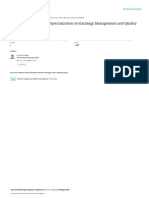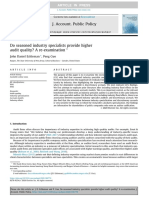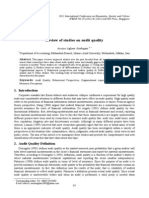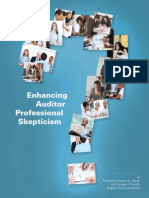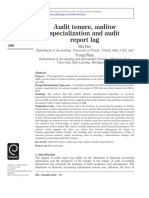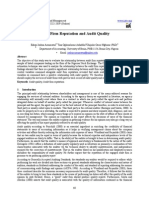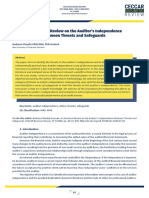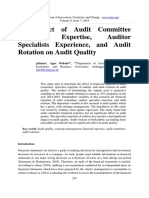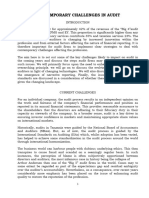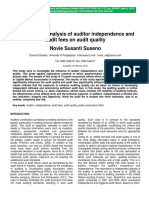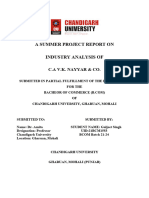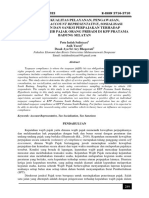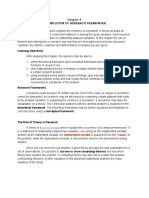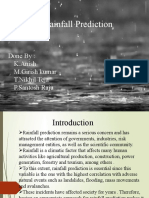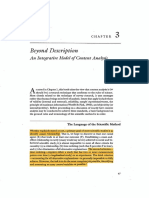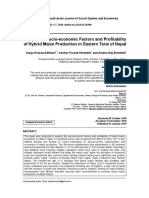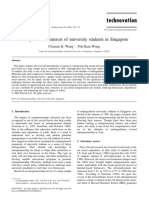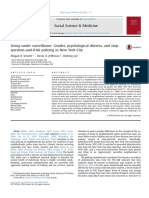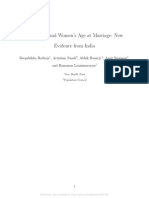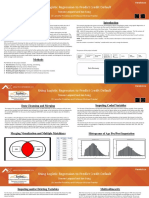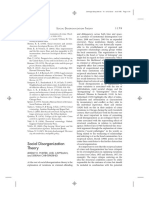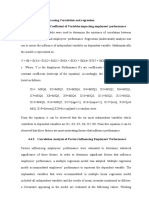DOI: 10.1111/1475-679X.12017 Journal of Accounting Research Vol. 51 No. 4 September 2013
Printed in U.S.A.
Does Auditor Industry Specialization Improve Audit Quality?
M I G U E L M I N U T T I - M E Z A*
Received 24 October 2012; accepted 7 May 2013 ABSTRACT
This study examines whether auditor industry specialization, measured usingthe auditor’s within-industry market share, improves audit quality and resultsin a fee premium. After matching clients of specialist and nonspecialist audi-tors on a number of dimensions, as well as only on industry and size, there isno evidence of differences in commonly used audit-quality proxies betweenthese two groups of auditors. Moreover, there is no consistent evidence of aspecialist fee premium. The matched sample results are confirmed by includ-ing client fixed effects in the main models, examining a sample of clients that switched auditors, and using an alternative proxy that aims to capture the au-ditor’s industry knowledge. The combined evidence in this study suggests that
*
University of Miami, School of Business Administration. Accepted by Philip Berger. This paper is based on the first chapter of my dissertation at the University of Toronto, Rotman School of Management. I gratefully acknowledge the guid-ance provided by my co-chairs Gordon Richardson and Ping Zhang, and the other membersof my dissertation committee, Jeffrey Callen and Gus De Franco, as well as the comments pro- vided by my external examiner Michel Magnan. I thank an anonymous reviewer, Yiwei Dou,Ole-Kristian Hope, Yu Hou, Stephanie Larocque, Alastair Lawrence, Andrew Leone, Matthew Lyle, Hamed Mahmudi, Mikhail Pevzner, Sundaresh Ramnath, Dushyantkumar Vyas, Franco Wong, Baohua Xin, workshop participants at Baruch College, Boston College, PennsylvaniaState University, Rutgers University, University of Miami, University of Southern California,University of Toronto, University of Waterloo, University of Western Ontario, the 2012 In-ternational Symposium on Audit Research, the 2011 AAA Auditing Section Midyear Confer-ence, and the 2008 CAAA Ph.D. Consortium, for helpful comments and suggestions. I alsoacknowledge the financial support of the Canadian Public Accountability Board. All errors aremy own.779
Copyright
C
, University of Chicago on behalf of the Accounting Research Center, 2013

780
M
.
MINUTTI
-
MEZA
the auditor’s within-industry market share is not a reliable indicator of audit quality. Nevertheless, these findings do not imply that industry knowledge isnot important for auditors, but that the methodology used in extant archivalstudies to examine this issue does not fully parse out the effects of auditorindustry specialization from client characteristics.
1. Introduction
Accounting firms recognize the importance of industry expertise in provid-ing high-quality audits and they strategically organize their assurance prac-tices along industry lines. A report on the U.S. audit market issued by theU.S. Government Accountability Office (GAO) in 2008 also acknowledgesthe importance of industry expertise, noting that “a firm with industry ex-pertise may exploit its specialization by developing and marketing audit-related services which are specific to clients in the industry and provide ahigher level of assurance” (GAO [2008, p. 111]). For example, Pricewater-houseCoopers highlights that “our audit approach, at the leading edge of best practice, is tailored to suit the size and nature of your organisationand draws upon our extensive industry knowledge” (PwC [2010]). Under-standing the benefits of auditor industry expertise is relevant for publiccompanies choosing among auditors, to regulators concerned with com-petition in the U.S. audit market, and to audit firms aiming to performhigh-quality audits while maintaining their competitive position in eachindustry.The importance of industry expertise has led auditing researchers to ex-tensively study its impact on audit quality. Experimental auditing researchprovides evidence that industry expertise generally enhances auditor judg-ment. Specifically, the findings of prior studies suggest that the auditor’sknowledge of the industry increases audit quality, improving the accuracy of error detection (Solomon, Shields, and Whittington [1999], Owhoso,Messier, and Lynch [2002]), enhancing the quality of the auditor’s risk as-sessment (Taylor [2000], Low [2004]), and influencing the choice of audit tests and the allocation of audit hours (Low [2004]). Archival auditing re-search has also examined the effects of auditor industry expertise; however,archival researchers cannot directly observe expertise at the firm, office, orauditor level. Consequently, this area of the literature has used each audit firm’s within-industry market share as an indirect proxy for industry special-ization, which in turn is assumed to be associated with industry expertise. A specialist auditor is defined as a firm that has “differentiated itself fromits competitors in terms of market share within a particular industry” (Nealand Riley [2004, p. 170]). A number of previous studies employing market share proxies have shown that the clients of specialist auditors have betterfinancial reporting quality than the clients of nonspecialist auditors do andthat specialist auditors charge a fee premium.There are conceptual and econometric problems associated with usinga market share proxy for auditor industry specialization. Conceptually,
DOES AUDITOR INDUSTRY SPECIALIZATION IMPROVE AUDIT QUALITY
?
781an audit firm may have extensive industry knowledge even when its within-industry market share is small relative to other audit firms. Inaddition, using a market share proxy causes important econometric issues.Defining specialization based on within-industry market share results indifferences in client characteristics between auditor types. By construction,auditors with large market share are more likely to have larger clientscompared to nonspecialist auditors. This definition of expertise constitutesa problem because a number of size-related client characteristics aresimultaneously correlated with the specialist variable and with commonly used audit-quality proxies and audit fees. The confounding effect of thesedifferences may not be properly addressed by cross-sectional regressionmodels.
1
A fundamental issue in this literature is determining causal inference.Empirical researchers should aim to compare treatment and controlgroups that have similar client characteristics, ideally approximating ex-perimental conditions where treatment is assigned at random. One way to achieve this objective is by matching clients of specialist and nonspecial-ist auditors on all relevant observable dimensions except for the treatment and outcome variables. Furthermore, matching mitigates model misspeci-fication problems by reducing or even eliminating the correlation betweenthe treatment variable and the matching variables.Following the prior literature on industry specialization, this study em-ploys three main audit-quality proxies: discretionary accruals, the auditor’spropensity to issue a going-concern opinion, and the client’s propensity tomeet or beat analysts’ earnings forecasts. Consistent with prior studies, thisstudy first shows a relation between the audit-quality proxies and auditorindustry specialization, and also between audit fees and auditor industry specialization. However, after matching clients of specialist and nonspecial-ist auditors on a number of dimensions, as well as only on industry andsize, there are no statistically significant differences in any of the audit-quality proxies between the two groups of auditors. Moreover, there is noconsistent evidence supporting the existence of a specialist fee premium.These findings are robust to employing a number of alternative matchingapproaches, additional market share cutoffs for auditor industry special-ization, additional audit-quality proxies, and controlling for the effect of imperfectly matched characteristics by considering the pairwise structureof the matched sample data.This study also documents confirmatory evidence from three additionalanalyses that do not rely on matched samples. First, including client fixed
1
These issues also impact the Big 4 audit-quality proxy. Boone, Khurana, and Raman [2010]and Lawrence, Minutti-Meza, and Zhang [2011] show that the previously documented asso-ciation between auditor size and audit quality can be attributed to differences in client char-acteristics, particularly to differences in client size. Similarly, the separation of specialist andnonspecialist auditors by within-industry market share creates two groups of auditors with dif-ferent client characteristics.
782
M
.
MINUTTI
-
MEZA
effects in the audit quality and fee models makes the coefficient on thespecialist variable statistically insignificant. Second, there are insignificant pre-/postdifferences in discretionary accruals, propensity to meet or beat analysts’ forecasts, and audit fees for Arthur Andersen’s (AA’s) clients that switched to auditors with a different degree of specialization in 2002. Third,employing a measure of specialization based on the auditor’s portfolio of clients provides a pattern of evidence inconsistent with a specialist effect onaudit quality and audit fees.Overall, the combined evidence provided in this study suggests that the auditor industry specialization, measured using the auditor’s within-industry market share, is not a reliable indicator of audit quality. Moreover,the extant empirical methodology does not fully parse out the confoundingeffects of client characteristics in determining the effect of industry special-ization on audit quality and audit fees. Finally, this study contributes to thebroad accounting literature on matching and comparability in estimatingtreatment effects.
2
Nevertheless, the reader should be cautioned that, al-though this study suggests that using the market share proxies for industry specialization leads to biased inferences, it does not imply that industry knowledge is not important for auditors.
2. Related Empirical Studies and Measures of Auditor Industry Specialization
The literature on auditor industry specialization has examined the im-pact of the auditor’s within-industry market share on audit quality andaudit fees. Using various proxies based on market share, extant stud-ies have documented a positive relation between auditor industry spe-cialization and the quality of reported earnings, suggesting that indus-try specialists provide higher quality audits than nonindustry specialists.Balsam, Krishnan, and Yang [2003] and Krishnan [2003] find a nega-tive relation between auditor industry specialization and the client’s ab-solute discretionary accruals. Balsam, Krishnan, and Yang [2003] alsofind a positive interaction effect between auditor specialization and earn-ings surprise in an Earnings Response Coefficient (ERC) model. Reichelt and Wang [2010] document a negative relation between auditor spe-cialization, measured at the city, national, and a combination of bothlevels, and the client’s absolute discretionary accruals. In addition, Re-ichelt and Wang [2010] show a negative association between auditor
2
The methodology used here could be adapted to other studies in accounting researchcomparing treatment and control groups, particularly where it is difficult to specify a correct model. For example, a study using discretionary accruals as a dependent variable and a treat-ment variable correlated with firm size and performance (e.g., management compensation,corporategovernance, orfinancial analyst following)maybenefitfromusingthemethodology applied in this study.


